We’re going to do a commentary of the dreamy, magically entertaining movie Elemental. If you’re looking for a review, then you may be disappointed, but hey, maybe this will change how you look at the movie?!
There are some of those spoiler-things below!

We’ll start with the themes we’re looking at: family and community. Our main flame gal Ember and the connection she has to her family, notably her father Bernie, and the other Fires in the Fire community is what motivates her the most, more so than the romance she has with goofy Water boy Wade.
Let’s break those themes down.
Disclaimer: all Elemental people will be called as follows for ease: Fire/Firish, Water, Earth, and Air. They will also be capitalised, as an indication of their ethnicty/race.
Opening Thoughts
We’ll begin with the title of the movie: Elemental. In the movie, all the Elements live in Element City, with the Firish living on the outskirts in their own separate community, connected only by a train whose track is a river of water, water that can easily extinguish any one of the Fires. The title isn’t Elementals, a plural word that groups all Elements together, but Elemental, a singular word that suggests that there is segregation. The movie is a none-too-subtle metaphor for xenophobia that happens in society, focusing on immigration to a Western City.
The opening is a montage of two Firish immigrants, one of which is heavily pregnant, arriving in Element City on a boat, full of hope, taking in the splendour of the world. We observe a Great Gatsby-esque light shining through the fog scene. Drawing attention to the similarity between this scene in Elemental to that in Baz Luhrmann’s 2013 Great Gatsby we can talk about light as a recurring symbol of hope, longing, and the dream of living in a successful community. In the Great Gatsby, the American Dream was something everyone wanted. In Elemental, Element City is meant to be a beacon of unity, freedom, and opportunity that everyone wants. Seeing the city obscured by fog, with only a redish glow indicating it was even there, to then be unveiled with the red light framing the city as if it was a sunset, represents the Fires desire for a new start. Unlike the Great Gatsby, the light in Elemental is not out of reach, although it could be argued that the unity between Elements is out of reach.
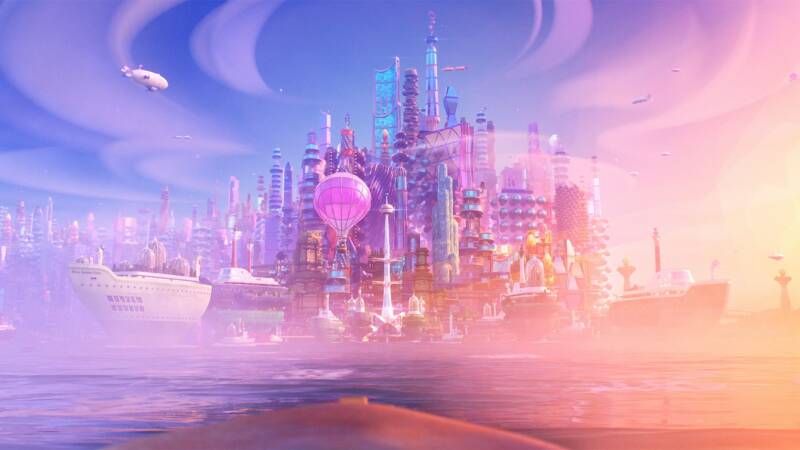

Element City is, visually, more on par with Los Angeles, but it is fundamentally a commentary on the experience of immigrants arriving and living in a foreign land. The soon-to-be parents arrive at a check-in desk and try to communicate their names in their native language, which is not spoken by the desk attendant, an Earth Elemental. This becomes problematic when the attendant gives the pair new names, Bernie and Cinder, which the Firish accept with hopeful smiles. From the get-go there is a huge emphasis that Water reigns supreme. As mentioned above, the public can use a train that glides on water to get around. Big problem: water kills fire. On the train, Bernie and Cinder face glowers from every other Element onboard. When the train sways, one Water passenger splashes onto Cinder, extinguishing part of her head. Perhaps there is a question here whether the Water purposefully tried to extinguish Cinder. But even if he didn’t, the train is clearly something Fires should not use, both because they may harm others (Fires burns Earth) and others may harm them. Segregation at its finest.
Parents Teach Their Children
Ember being born is a happy occasion. Bernie is boundlessly doting on his wife and daughter, and respects all the Firish traditions from his homeland, and he inspires Ember to do the same. He perpetuates the Firish disdain for Water to his daughter, emphasising that although the parents arrived in Element City with hope and longing, they too adopted the ‘them and us’ mentality that the other Elements hold for them. An example of Bernie’s xenophobia is when he calls Water people ‘Water’, not Water people or person, grouping them together rather than seeing the individual.
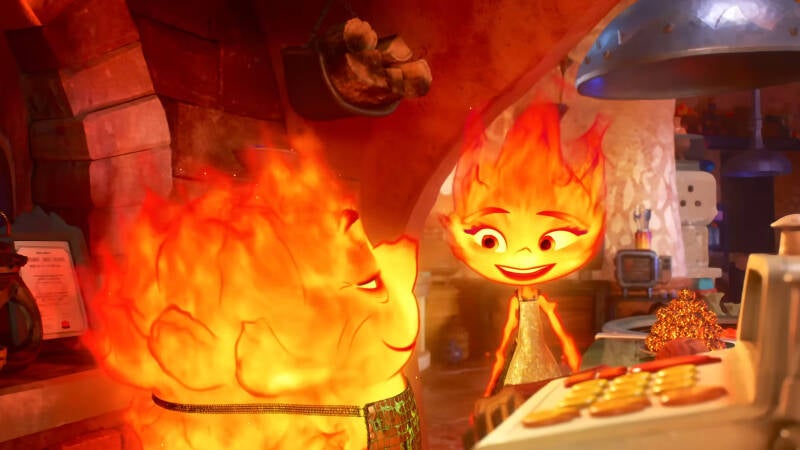
Ember corrects Bernie’s use of this word later in the film, suggesting Ember’s departure from the viewpoints of her father. It is tragic for the Firish to perpetuate this xenophobia, especially because they clearly adore community and family. For them, their own light and love is the hearth of their home that keeps them going. Bernie’s dedication to creating a convenience store, The Fireplace, encourages an entire community of Fires to build up around them. Bernie and Cinder have the community and fresh start they wanted, with them at the heart of the community.
The movie’s devotion to family and community is shown through Ember's desire to do her father proud. To her, her parents, especially Bernie, sacrificed everything for their life in Element City. Throughout the montage of her growing up, we learn how much she thinks she wants to run The Fireplace, to take over from her hard-working father so that he can enjoy his retirement feeling fulfilled. Ember is told by her father repeatedly that she will take over “When [she] is ready”. This line itself never suggests that Bernie expects Ember to take over, but more that she will only take over if she is ready. The reason he uses the word “when” and not “if” to Ember, is because she does not express anything other than wanting to run the shop. The lack of transparency between father and daughter here causes the issue in the movie: Ember does not want to disappoint her father because she thinks she must run the shop. After all, that’s all she knows. Ember is obsessed with being a good daughter, because respecting one’s elders and being part of a strong family unit is integral to the traditions of the Firish. This ‘good daughter’ mentality carries the movie and carries it hard, to the point where it feels like it is lacking the breadth Pixar excels at. It’s lovely that Ember loves her father so, but it is sad that she cannot see any other future for her other than serving her own community because she has had to live separate from Element City all her life. Even her own mother predicts that she will have a “Loveless sad future of sadness”, as if Ember was fated to be sad running the shop.
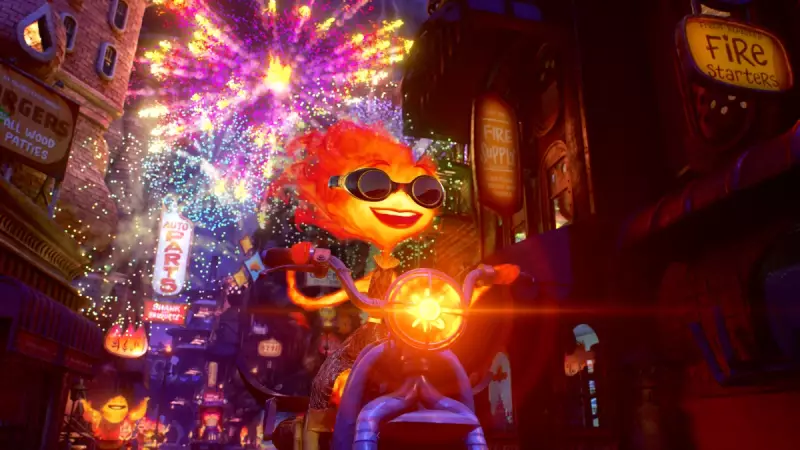
The sense of community amongst the Fires is strong. Ember knows everyone and what they need, shown when she does the delivery run and expresses to every Fire along the way that she is in a rush because she wants to beat her dad’s time. The Fires respond with smiles and understanding because they are such a tight knit community. Even when the customers of The Fireplace anger Ember due to their demands, she is still able to make jokes with them. Strangely, we are introduced to Clod, an Earth elemental boy, who is crushing hard on Ember. He offers her a flower, which she burns into a puff of smoke.

It is not explained how Clod and Ember met, nor suggested where Clod lives, but it seems unlikely that he lives with the Firish given he is flammable. However, Ember’s interactions with Clod compared to her interactions with the other Firish clearly shows her adopted xenophobia. It was not necessary to burn the flower Clod gave her, the act coming across as cruel. Her burning the flower is her burning the bridges between the Fires and the other Elements, even when a non-Fire is wanting to extend their earthen hand, a first in the movie.
Water Opens Up a New Path
Wade is introduced to the movie in a torrent of watery chaos, literally rising from a huge puddle and crying streams of water. Ember’s life is at risk for a fair bit of the movie due to the Water that she finds herself surrounded by. This is the reason why her romance with Wade is so powerful as she risks her life to get to know him. It is possible that the water extinguishing fire reality is in fact a metaphor for the Firish tradition being threatened by the foreign country they live in. In a sense, immigrating to a place that does not share your culture could extinguish said culture. This is why the Fire community having their light and love as the hearth of their homes is shown to the extent it is. The Fires don’t want to be extinguished by the xenophobic world around them.
Wade’s initial dialogue in the movie begins with a photograph featuring a young Ember with her family, where he inquires, “Is that you and your dad?” What is intriguing here is that Wade highlights the father-daughter relationship but omits any mention of her mother. Given the movie’s overarching theme of family and community, it raised the question: why does the narrative exclusively underscore the bond between father and daughter? One plausible explanation lies in the portrayal of a tight-knit community shaped by past experiences of segregation. This portrayal suggests that individuals within such communities may feel a heightened responsibility to act in the best interest of the collective. Ember, as an only child with an aging and ailing father, must contend with a deep-rooted desire to honour her family and community, specifically the father who gave up everything for her. As such her perspective is confined to the world she knows, making it challenging for her to envision anything beyond her familial ties.
A Father's Love
The movie switches gears from a montage of a family finding their way in a xenophobic world to Ember needing to save The Fireplace. Wade, as a city inspector, points out several faults with The Fireplace, including the fact that it was built by Bernie without permits. Wade cries repeatedly during his write up of the place, seeing how special Bernie is and how much Ember loves him. In fact, Ember’s dedication to her family inspires Wade to help her save The Fireplace. He incurs Ember’s wrath when he understands Ember’s anxieties about losing the shop, rightfully suggesting that Ember believes her father will be disappoint in her, ashamed, and it is all her fault. Ember loses her temper at this and, literally, explodes.
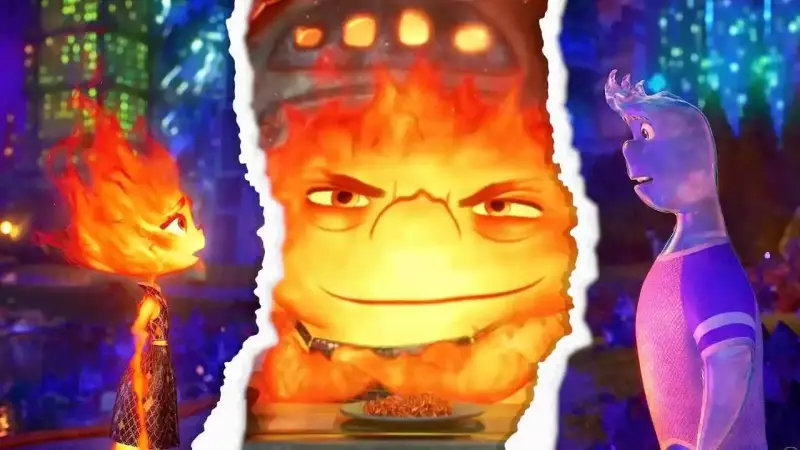
She does this because she believes it to be true, and her emotions, not just anger, get out of control. However, there has been nothing in the movie to suggest that this is true, as we have seen how much Bernie trusts and respects his daughter. It is noteworthy that Wade upsets Ember as much as the customers do in The Fireplace. This is not an indication that Waters are naturally abhorrent but instead shows Ember is easily overwhelmed by the reality of something aside from the community and family. Wade angers her so because he shows her a future she could choose, not one that is chosen for her.
For Ember to save The Fireplace, she must convince Wade’s boss, Air Elemental Gale, to not shut down the shop. Wade and Ember decide to approach Gale at a sports game, Element City’s airborn version of basketball. Gale and Ember argue, insulting each other with Element-based slurs (although this is depicted as comedy in the movie). At first, both do not know that they are each motivated by their love for their fathers. Gale doesn’t want to talk to Ember because she is engrossed in the game, but Ember cares little for it, prioritsing The Fireplace.

They later learn that Gale loves the game because it keeps the memory of her father alive, and Ember wants to save the shop for the same reason. The game itself becomes a representation of familial love, for one of the players, previously unstoppable, has become unmotivated due to his sick mother. The powerful encouragement from Wade gets the player inspired, meaning the team Gale supports wins the game. With Gale in high spirits from the game, she is more willing to hear out Ember, especially because she sees herself in Ember.
Elements Unite
Ember becomes increasingly more pressured to maintain her dedication to her family as she spends time with Wade and the other Elements. Even her interaction with Gale opened her eyes to the fact that other people in Element City share her values, which goes against the xenophobia her father taught her. She finds that her gift with glassblowing, the combination of air and fire, could be her future, even being offered an internship outside the city. Ember begins to see the world she lives in as bright and exciting, and we begin to wonder if perhaps she was just scared of anything outside of her Firish community - understandable when Water could literally kill her.
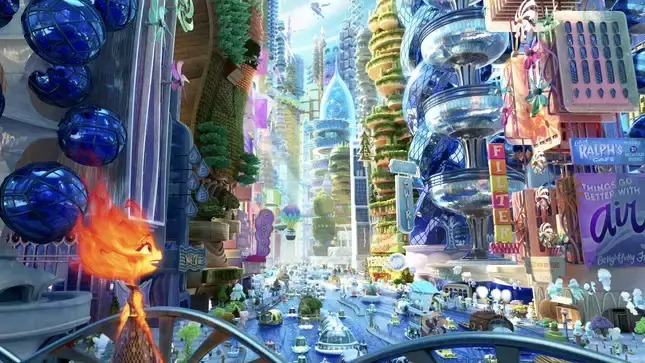
Whilst she previously looked at the water train with disdain, she later looks at the water cascading from the tracks as the train goes by with a hopeful smile. She can look at her reflection in the water without having her umbrella up, watching it cascade down in such a way that it creates a magical watery veil that obscures The Fireplace. When the veil is lifted, she sees The Fireplace, and remembers her duty to the hearth and home, and her smile drops.

Wade returns to The Fireplace in a very symbolic way. He delivers himself to Ember in various flower vases, delivered by an Earth Elemental. Here, three Elements are seen together in a very normal and innocent scenario: the gifting of flowers. Slowly, Wade and Ember’s love are bringing the Elements together. They are expanding the community to include every Element, breaking down the barriers of xenophobia. However, his presence in the shop is discovered by Bernie, who gives Wade some Fire food after the Water lies about being a food inspector. Wade, being Fire’s opposite, can barely eat the food, resorting to combining it with his own water, making it much more palatable for him. This infuriates Bernie because he can’t accept that the Elements can combine, shouting “Water it down? WATER IT DOWN?! We will never be watered down by you.”
This sentence is significant to the reason behind the xenophobia that happens in Element City. The Elements do not want to have to change just because there are different Elements living amongst them. Water doesn’t like Fire because it makes them boil. Earth doesn’t like Fire because it makes them burn. Bernie doesn’t like other Elements because he fears that they will take his traditions away by watering them down.
The more the Elements come together in the movie, the more stressed Ember gets. During the Crying Game in which Ember claims she has never cried, Wade gets her to cry about the thought of two different Elements uniting, her and Wade. Later on, even though it has always been claimed that Fire and Water cannot be together, Cinder performs a ritual that proves that Wade and Ember are a perfect match for each other. It is something that both Ember and Cinder work to hide from Bernie, simply because they do not wish to go against Bernie. Ember is so worried about disappointing her father, yet after her experiences with Elements living in harmony, she realises that the responsibility to take on The Fireplace is a burden, which she is aghast to say as she believes it makes her a bad daughter. The perfect daughter in her eyes is one that serves the family and stays in the community. Thus, when offered a choice to leave the city and pursue glassblowing, something she excels at, she panics. This choice doesn’t conform to the ‘good daughter’ mentality. She can’t run the shop, relieve the burden from her father, nor help the community if she leaves. But these are all mentalities that link back to the fact that she was brought up in a community who all experienced extreme segregation and she feels guilty for leaving.
The Blue Flame

Wade is an exception to the film’s father-offspring depiction. Wade’s father died before Wade could receive guidance on where to go in his life. It is true that children are motivated by what their parents teach them. Wade believes Ember is lucky that she has direction because of the connection she has to Bernie. It is during this interaction, whilst drifting on a hot air balloon, that Ember shares the saying ‘Deshlock’, which essentially means ‘embrace the light whilst it burns because it won’t always last forever’. ‘Deshlock’ is a very complicated word considering the movie, as it could have multiple meanings.
In the context Ember uses it in, ‘Deshlock’ means to take every opportunity you have before it is gone. Wade interprets ‘Deshlock’ as live every moment like it’s your last, which is why he is so motivated to make Ember see that she has the choice to make her future her own. ‘Deshlock’ could also be a phrase that means to love your family as you don’t have forever with them. But ‘Deshlock’ has a whole other meaning when you consider the metaphor of the blue flame in the movie.
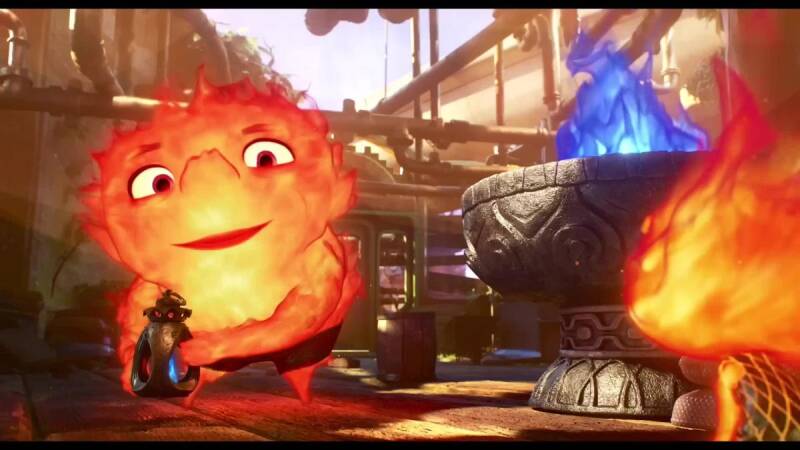
The phrase ‘light and love of the hearth’ has been mentioned several times thus far. To give context to this, Bernie and Cinder brought a blue flame with them from their homeland, Flameland. In Flameland, every household had a blue flame, representing unity between Fire and their connection to each other. However, a great storm came and destroyed Bernie and Cinder’s home, and only their flame survived. The flame also survived the journey to Element City. Bernie and Cinder leaving Flameland was tragic, because they had to leave their family in exchange for a better life. Bernie’s own father rejected him, for leaving the community would mean they would forever be exiled.
For the blue flame to survive both the great storm and the journey, it becomes the heart of the family, something for them to rely on as it was always there. Whilst it lives, the family can thrive. Therefore, Ember’s determination to take over the shop, thus safeguarding the blue flame, represents her desire to protect the family. One point to mention is the fact that the blue flame is not shared with other Fire families, like it was in Flameland. One reason for this could be that the blue flame represents only the Lumen family. Another reason could be the fact that it is the only connection Bernie and Cinder have to their homeland and sharing it would be like sharing a family heirloom. Alternatively, there could be a blue flame in each Fire’s house, separate from the Lumen’s. In a sense, each household has their own ‘blue flame’, whether it be a literal blue flame or something equally as symbolic.
The film concludes with the great flood of the Fire community, a death sentence for any who does not get out of the way. The flood happens after it is revealed Ember was the one who caused The Fireplace to flood, causing a break of trust between her and Bernie. Ember leaves the Fire community to sit on a bench overlooking Element City, the scene comprising of all four Elements in their retrospective areas. Ember observes how far Fire is from the city and bemoans “Why can’t [she] just be a good daughter?”. Again, because the family and community are so important to the Firish, Ember cannot comprehend what she can do to be the best daughter she can in a world that cannot accept each other. She feels like her only choice is to stay in the Fire community and run The Fireplace, because how could she possibly have opportunities elsewhere after the years of segregation she has experienced? It is then that the flood begins to flow, rushing straight towards the community she loves so much.
When the blue flame is threatened during the great flood, Wade exclaims that the “Flame is done” which, if the blue flame is a representation of the heart of the family, suggests that the family is over. Ember refuses to give up, her love for her family prevailing over the reality that she could die. When the flame is seemingly lost to the flood, it is Wade who reveals he saved it, a non-Fire who proves that they share the Firish values surrounding family. When Wade ‘dies’, Ember loses her connection to the other Elements, and she admits to her father everything that she was not willing to admit even to herself. She doesn’t want to run the shop, for the shop was her father’s dream and not her own.

It is here that Bernie, after a whole movie, finally gets Ember to realise that the shop was not his dream. She was. She was always the dream. And thus, Wade’s death was the event that brought the family back together. In a sense, Wade was Ember’s blue flame. But Pixar wouldn’t be Pixar if there wasn’t a tear-jerking ending. As Ember and Bernie hug, their tears and emotions freely running as they fully understand each other, Wade too begins to cry, revealing he was not truly dead, and reforms himself, with Ember’s help.
Concluding with the Big Bow
Elemental’s biggest themes of family and community are beautifully depicted with the tradition of the Firish Big Bow (Bà Ksô). Bà Ksô is a symbol of respect and a way for each other to give their blessing. When Bernie and Cinder leave Flameland after their home was destroyed, Bernie performs the Big Bow to his father, hoping to receive his blessing for the journey ahead. But Bernie’s father refused to reciprocate, meaning Bernie arrived at Element City having lost his connection with this father, and without his blessing.

At the end of the film, Ember understands her father as much as he understands her. In a perfectly poetic scene, the movie does a close up of Ember’s feet about to embark on a new journey away from the city she was brought up in, just how we got a close up of Bernie’s feet when he is about to leave Flameland. Ember pauses, just how Bernie did, turns, and performs the Big Bow, wanting her father to give her his blessing on a journey she could start her new life with. The parallel between these scenes are obvious, but there is one difference that really makes Ember’s Big Bow more powerful. Bernie reciprocates the Big Bow, whilst his father didn’t.
Moreover, Ember does not open her eyes, like Bernie did to see if his father reciprocated. Neither father or daughter open their eyes during the Big Bow, showing that they trust and love each other enough to not need to look. Ember and Bernie’s light and love for their hearth and home, for each other, was so strong, that no words or looks are needed for the pair to know that their love is eternal.
Whether you agree with anything this commentary talks about or not, it cannot be denied that Elemental is a family-friendly film full of the tear-jerkers and comedy that Pixar is well-known for. It doesn’t hide any of its themes, nor has too many hidden meanings to unravel. However, the consistent and beautiful way Pixar shows the importance of family and community is a wonderful message to have. Every family should have their own blue flame that motivates them to be creative, loving, caring, and together.

Create Your Own Website With Webador